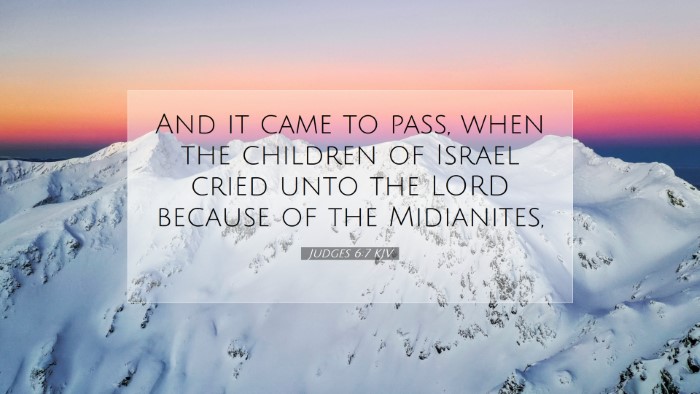Commentary on Judges 6:7
Bible Verse: Judges 6:7 - "And it came to pass, when the children of Israel cried unto the LORD because of the Midianites."
Introduction
The verse being considered is situated within a profound narrative that highlights the cyclical nature of Israel's sin and deliverance. It marks a pivotal moment in the Judges narrative, where the cry of the Israelites signals the beginning of God’s redemptive intervention through chosen leaders. This commentary merges insights from esteemed public domain commentaries, including those from Matthew Henry, Albert Barnes, and Adam Clarke. The focus is on the theological implications and the practical applications of this verse for pastors, students, theologians, and Bible scholars.
The Cry of the Israelites
The verse indicates a significant turning point for Israel as they find themselves under oppression by the Midianites. Matthew Henry notes that this cry was not merely a call for physical rescue but a spiritual awakening and acknowledgment of their plight due to idolatry and disobedience. This response was vital for their repentance and restoration.
-
Spiritual Implication: The act of crying out demonstrates a recognition of their need for divine intervention. It's a precursor to repentance and denotes an understanding of their helplessness.
-
Pattern of Apostasy: Albert Barnes remarks that Israel often fell into sin, leading to oppression, followed by a cry for help. This cyclical pattern reflects human tendencies to stray from divine mandates before seeking redemption.
The Role of God in Israel’s Deliverance
Following their cry, the thematic presence of God's mercy and deliverance is emphasized. Adam Clarke underscores the faithfulness of God in responding to His people, despite their repeated disobedience. The significance of this verse lies in its illustration of the character of God as one who hears and responds.
-
Divine Compassion: God is portrayed as compassionate, ready to respond to the suffering of His people. This underscores an essential truth about God's nature: He listens attentively to the cries of the distressed.
-
Prophetic Response: This verse precedes the anointing of Gideon, showcasing how God raises leaders to bring about deliverance in times of need.
Historical Context and Application
This cry of the Israelites during their oppression serves as a reminder of the historical context of God’s dealings with His people. At this juncture, the Midianites had overrun Israel's land, leading to severe hardship, a reality that should stir empathy in the heart of the reader. Barnes highlights the physical and spiritual degradation that often accompanies sin, which can serve as a sobering reminder to contemporary readers.
Key Applications:
-
Understanding Human Vulnerability: The narrative teaches about human vulnerability and the need for divine aid. In modern times, recognizing our limitations can lead to a greater dependence on God.
-
The Importance of Repentance: Genuine repentance is crucial for restoration. The cry of the Israelites signifies their readiness to return to God, emphasizing the importance of confession and turning back to Him.
-
Divine Intervention in Crisis: The story serves as a reminder of God's willingness to intervene in crises when His people genuinely seek Him. Psalm 34:17 reinforces this by declaring that the Lord hears the cries of the righteous.
Concluding Reflections
Judges 6:7 encapsulates a profound moment of desperation that leads to divine action. It serves as an excellent reminder for pastors and theologians to emphasize the importance of repentance and the mercy of God in preaching. The orderly encouragement for believers to cry out in times of distress is ever relevant, showing that the pattern of divine rescue remains consistent throughout Scripture. As we engage with this text, may we embrace its truths and reflect on our lives, ensuring we remain steadfast in our commitment to God amid life's challenges.


